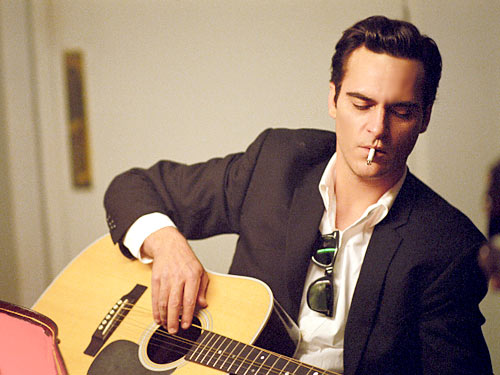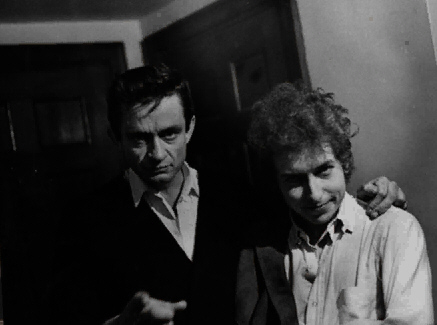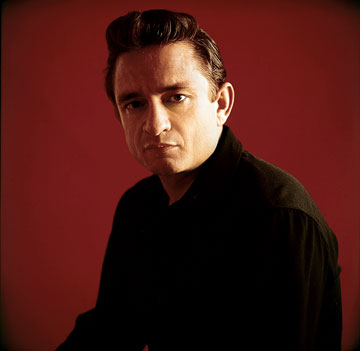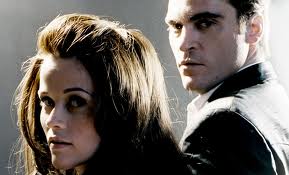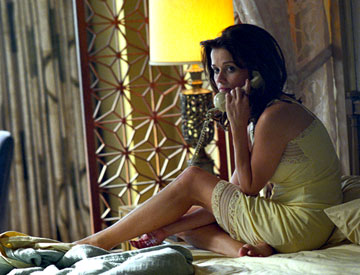Happy Valentine’s Day. In keeping with a GitM tradition started last year, and since y’all out there, dear readers, are once again my Valentines for the day whether you like it or not (I long ago stopped delving into personal detail around these parts — Suffice to say that, my fellow Americans, the State of the Love Life is, um, not good. In fact, like those pesky WMD, its existence has been almost entirely theoretical for some time…Ah, well.) — I’ve thrown up more tunes for your holiday perusal. At any rate, as per the usual mp3blog rules: the files will be only up for a day or two, right-click to save them, and please don’t link to them directly. Otherwise, enjoy!
Stare at the TV screen
I don’t know what to do
I need a rendezvous
For sundry reasons involving the Internet Age, Kraftwerk’s “Computer Love” has taken on all kinds of ulterior meanings since it first debuted on 1981’s Computer World, when 300 baud modems (“I call this number for a data date“) and TRS-80s operating on tape decks were the order of the day. When these German electronica pioneers weren’t creating the music of the future, it seems, they were presciently anticipating our current era of Instant Messaging, online dating sites, and the like. Still, its newer resonances notwithstanding, I’ve always found something giddily innocent about this track. While the lyrics suggest a much more downbeat affair, the chirps and whistles in this song never fail to bring a big goofy grin to my face — particularly in this clubbier 1991 remix version, when those syncopated synths take off like a bird in flight. There are some songs that just make ya happy, no matter what — for me, this is one of those.
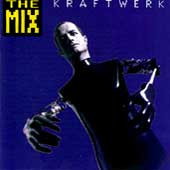
Computerlove — Kraftwerk (6.2MB, 6:37)
(song removed)
From The Mix.
[Update:]
And it feels like home
And there’s someone
Calling on the telephone
Let’s stay home
It’s cold outside
And I have so much
To confide to you
As I’ve wrote in this review of Ultra years ago, Depeche Mode is a band that’s been misunderstood and misunderestimated by a lot of people here in America. Which is not to say they’re some hidden secret — obviously, they’re one of the biggest bands in the world, and have had a huge US following for decades now.
Still, even today, in the reviews of DM’s recent Playing the Angel, rock critics trod out the doom-and-gloom “Depressed Mode” copy that’s been circulating since at least 1986’s Black Celebration. But they miss the point. Very few DM songs — Ok, “Satellite,” from A Broken Frame is one — are out-and-out depressing in the way, say, most Nine Inch Nails songs are. Rather, almost all of the songs on Black Celebration, one of my Desert Island discs, work in the same groove, including this one, “Here is the House.” As one review of “Enjoy the Silence” summed it up, it’s “me and you against the world.”
Yes, Celebration argues, this earth can be a cruel, unrelenting place, filled with misfortune and disappointment. But, maybe, just maybe, you and I can rise above all that, and together light a candle that’ll warm us both through another unforgiving night. In sum, DM’s best romantic ballads aren’t depressing so much as poignant and ever-so-slightly hopeful. I’ll be the first to admit that the band has come close to over-mining this particular mode after 25 years, but still, when they do it right, it’s a thing of beauty. (Also, since I’m sure a lot of people out there already have this song in their collection, I’ve also posted Martin’s early demo version, which actually fits the song really well in a lo-fi Magnetic Fields kinda way.)

Here is the House — Depeche Mode (4.1MB, 4:19)
Bonus Track: Here is the House (Demo) — Martin Gore (4.3MB, 4:35)
(songs removed)
Original version on Black Celebration.
[Update:]
running through my veins
the blood of eden keeps rushing through me
when I’m sure there’s none that remains
I had a hard time figuring out which song I wanted to post from Peter Gabriel’s sublime rumination on romance, Us (1992), ’cause almost every song — particularly on the A-side — is a certifiable classic. (A younger friend of mine once musically conflated Gabriel’s oeuvre with that of his Genesis bandmate Phil Collins, which almost drove me to apoplexy. I mean, I don’t hate Phil Collins or anything, but, c’mon now — Gabriel is a lot more than just “Sledgehammer,” and even “Sledgehammer” isn’t “Susudio.”)
In the end, I opted for this cut of “Blood of Eden” from Wim Wender’s Until the End of the World (which for some odd reason was left off that otherwise great soundtrack.) The Us version is disarmingly beautiful, but the lack of Sinead O’Connor’s backing vocals here lend the track a different resonance.
On the album, you can actually hear “the union of the woman and the man” in O’Connor and Gabriel’s lush harmony, but here, with Gabriel plaintive and alone, it’s just a fading memory, the echo of happier times. And yet, at certain moments (such as in the bridge), the memories come flooding back. “The blood of eden keeps rushing through me, when I’m sure there’s none that remains.” With love in the rear-view mirror, disappearing over the horizon, Pete still has the echoes of the past to keep him keepin’ on.

Blood of Eden (Wim Wenders Version) — Peter Gabriel (6.2MB, 6:40)
(song removed)
From Blood of Eden (Single).
[Update: The Wim Wenders version is hard to find on the tubes, but below is the original version with Sinead O’Connor.]
It’s well understood,
Most of the time
I wouldn’t change it if I could,
I can’t make it all match up, I can hold my own,
I can deal with the situation right down to the bone,
I can survive, I can endure
And I don’t even think about her
Most of the time.
Speaking of which, nobody does keep-on-keepin’-on like its coiner, the inimitable Bob Dylan. From “Don’t Think Twice” to “Like a Rolling Stone” and Blood on the Tracks to Time out of Mind, one of Bob’s career trademarks has been the post-mortem relationship song. Some are angry and vindictive, some are haunted, some are jaunty and could care less, some are resigned and reflective, some are (love)sick with remorse and regret. There are so many great songs that could have gone here, but I ended up choosing “Most of the Time,” from the somewhat underappreciated Oh Mercy (1989), the forerunner to Dylan’s recent revival. In this song, Bob’s basically got his act together and has moved on from an old love…most of the time. In direct contrast to Gabriel in “Eden,” the past here is treacherous. (“Most of the time, I can’t even be sure, if she was ever with me or if I was ever with her.“) Dylan’s learned to live with his scars, but at any moment — a passing haircut, a fleeting remembrance, a scent of perfume in the air — and he is undone once again, as if it were yesterday. After all, even for a guy like Bob Dylan, who once seemed to carry the weight of the world as if it were nothing, you don’t get very far in life without some ghosts in the machine.

Most of the Time — Bob Dylan (4.5MB, 5:03)
(song removed)
From Oh Mercy.
[Update:]
Ok, hopefully five tunes won’t kill my bandwidth…Have a safe and happy Valentine’s Day out there, y’all. (And, as a side note, if you’re looking for more quality music, be sure to check out the splendiferous Fluxblog almost-daily, and don’t miss out on the Max Music Mixes every month at Lots of Co.)


